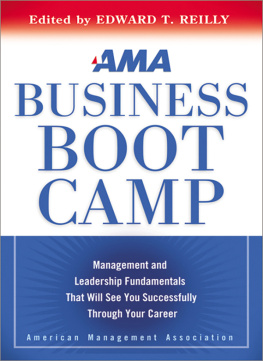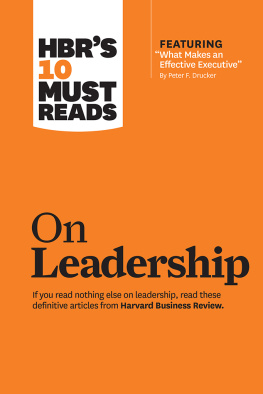
Contents
List of Illustrations
List of Tables
List of Exhibits
Pages
Guide

Business Leadership
A Jossey-Bass Reader
Second Edition
Joan V. Gallos
Editor
Foreword by Ronald A. Heifetz
Copyright 2008 by John Wiley & Sons, Inc. All rights reserved.
Published by Jossey-Bass
A Wiley Imprint
989 Market Street, San Francisco, CA 94103-1741www.josseybass.com
No part of this publication may be reproduced, stored in a retrieval system, or transmitted in any form or by any means, electronic, mechanical, photocopying, recording, scanning, or otherwise, except as permitted under Section 107 or 108 of the 1976 United States Copyright Act, without either the prior written permission of the publisher, or authorization through payment of the appropriate per-copy fee to the Copyright Clearance Center, Inc., 222 Rosewood Drive, Danvers, MA 01923, 978-750-8400, fax 978-646-8600, or on the Web at www.copyright.com. Requests to the publisher for permission should be addressed to the Permissions Department, John Wiley & Sons, Inc., 111 River Street, Hoboken, NJ 07030, 201-748-6011, fax 201-748-6008, or online at www.wiley.com/go/permissions.
Readers should be aware that Internet Web sites offered as citations and/or sources for further information may have changed or disappeared between the time this was written and when it is read.
Limit of Liability/Disclaimer of Warranty: While the publisher and author have used their best efforts in preparing this book, they make no representations or warranties with respect to the accuracy or completeness of the contents of this book and specifically disclaim any implied warranties of merchantability or fitness for a particular purpose. No warranty may be created or extended by sales representatives or written sales materials. The advice and strategies contained herein may not be suitable for your situation. You should consult with a professional where appropriate. Neither the publisher nor author shall be liable for any loss of profit or any other commercial damages, including but not limited to special, incidental, consequential, or other damages.
Jossey-Bass books and products are available through most bookstores. To contact Jossey-Bass directly call our Customer Care Department within the U.S. at 800-956-7739, outside the U.S. at 317-572-3986, or fax 317-572-4002.
Jossey-Bass also publishes its books in a variety of electronic formats. Some content that appears in print may not be available in electronic books.
Credits are on page 595
Library of Congress Cataloging-in-Publication Data
Business leadership: a Jossey-Bass reader / Joan V. Gallos, editor.2nd ed.
p. cm. (The Jossey-Bass business & management series)
Includes bibliographical references and index.
ISBN 978-0-7879-8819-7 (pbk.)
1. Leadership. 2. Management. I. Gallos, Joan V.
HD57.7.B875 2008
658.4'092dc22
2007019066
The Jossey-Bass
Business & Management Seriess
For Christopher John Gallos Bolman and Bradley Garrison BolmanReach high, my sons, for stars lie hidden in your souls
Foreword
The demands of change have always challenged collective enterprise. People have faced new pressures and opportunities from the beginning of time, and many of our current ways of doing business are practices that have evolved in response to the adaptive challenges of their day. With change a constant in todays global business environment, adaptability remains critical for sustained success.
For nearly four million years our early ancestors lived in small bands that foraged for food. They developed ever increasing sophistication in the design of tools and strategies for hunting and movement; and their physical capacities grew through evolutionary change. About twelve thousand years ago people learned to domesticate plants and animals, and new abilities to store food allowed and required sustained settlements. Large numbers of people living together brought new needs for governing organizations and communities. These in turn were met by drawing on the small-group authority relationships that had worked so well before, now amended for greater complexity to fit the differing contexts of military command, civil governance, and commercial organizations.
This process of adaptation to new possibilities and challenges has continued over the course of written history, with growth and variation in the scope, structure, governance, strategy, and coordination of political and commercial enterprises. So has the evolution of our understandings of leadership.
Leadership is the process of mobilizing progressfostering peoples adaptive capacities to tackle tough problems and thrive. Successful adaptations enable a living system to take the best from its history into the future. They are both conservative and progressive.
When we anchor the concept of leadership in the work of progressin resolving contradictions within our cultural DNA or between our cultural DNA and the demands of our environmentwe come to view authority and power as tools, rather than as ends in themselves. Neither authority nor power defines leadership, although both are central to its practiceand can, if misused, become significant constraints. Too many individuals in positions of power today do not exercise much leadership, and we need to understand more deeply how acquiring authority limits, not just enables, good leadership.
This volume reflects decades of work by multiple individuals to identify common principles of success and the leadership that helps to generate it. Looking through various lenses we have come to understand the workings of organizational adaptation in different ways, yet all appreciate how businesses and communities can thrive in new and challenging contexts. In my work across sectors and around the world, for example, I find that the logic of biological adaptation drawn from Darwins theory of evolution provides insights into organizational and cultural adaptation. And I want to use six ideas as a suggestive set of properties to frame this wonderful collection of chapters. Let me begin with the links between leadership and change.
Leadership is about change, but not just any change. Many regressive and destructive actions generate change, but we would not consider them acts of leadership. Take, for example, the assassinations of Lincoln, Kennedy, King, Sadat, and Rabin. Or look at the daily murders and muggings that profoundly change lives in communities around the world. These are societys miscarriages. The change that we intuitively associate with leadership is enabling. Changing environments and new dreams demand new strategies and capacities and the leadership to mobilize them. As in evolution these new combinations and variations allow organizations to thrive under challenging circumstances rather than perish, regress, or contract. Our concepts of leadership, then, must wrestle with normative questions of value, purpose, and process. What does thriving mean for businesses operating in any particular context?
In biology, thriving means propagating. But in business, mission, objectives, and method are more complex. Thriving thus becomes a mix that includes short- and long-term shareholder value, quality of service, employee morale, and social and environmental impact. Adaptive success in a cultural rather than a Darwinian biological sense therefore requires business leadership that can orchestrate conflicting priorities among legitimate stakeholders in order to clarify the stakes. Moreover, priorities do not remain stable: they change as circumstances and contexts do. From this perspective, leadership operates within a dynamic tension where essential priorities and bottom lines are less clear than many initially imagine them to be.
Next page











 Business Leadership
Business Leadership